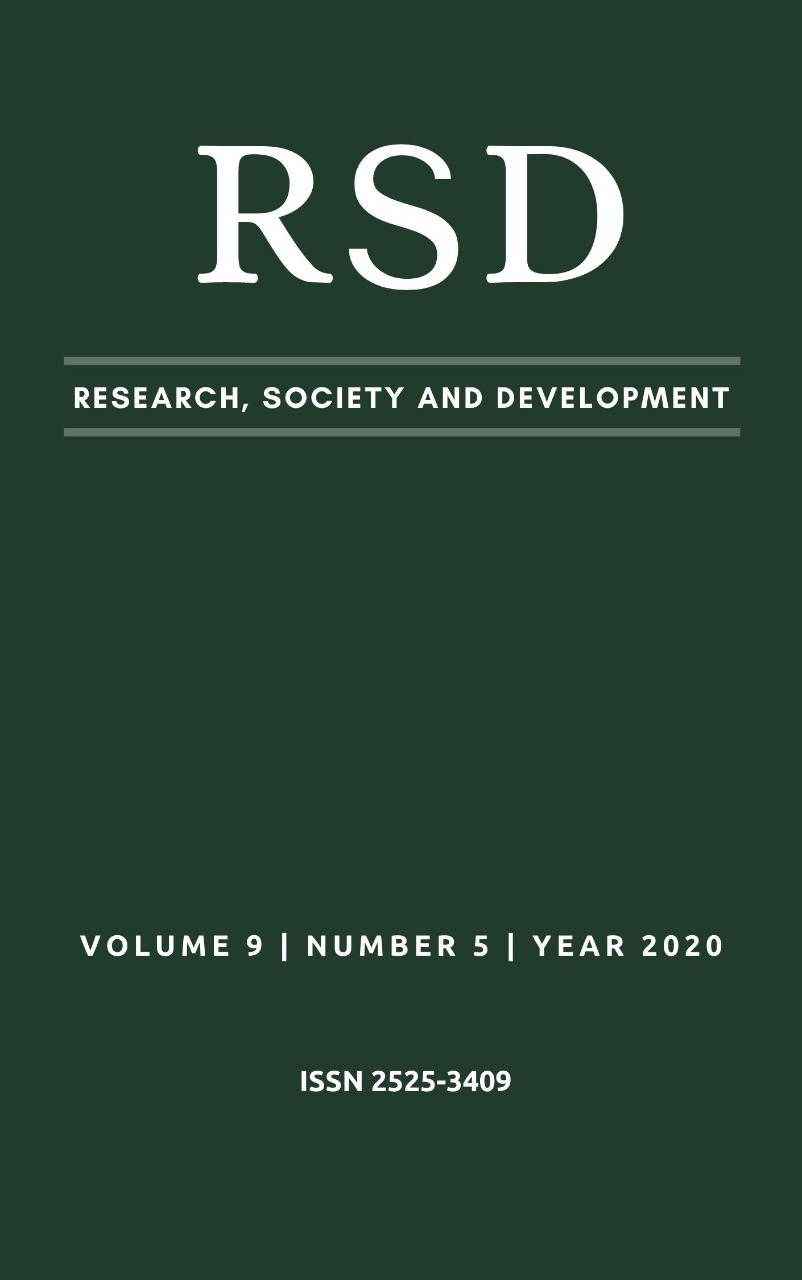Os impactos da Doença de Alzheimer na Saúde Mental dos Familiares e Cuidadores: Relato de Experiência
DOI:
https://doi.org/10.33448/rsd-v9i5.3157Palavras-chave:
Doença de Alzheimer, AMICA, familiares e cuidadores.Resumo
O presente estudo tem como objetivo verificar na literatura científica as particularidades da Doença de Alzheimer, os impactos nos familiares e cuidadores, relacionando com as atividades do projeto de Assistência Multidisciplinar Integrada aos Cuidadores de Pessoas com Doença de Alzheimer (AMICA) da Universidade Franciscana. A coleta de dados se deu da busca por conteúdos presentes em materiais já publicados, como artigos científicos nacionais, periódicos, teses e dissertações, oriundos de bases de dados de livre acesso, como Periódicos da CAPES, Scielo, Disciplinarum Scientia e Bibliotecas Virtuais. Ainda, através de observações participantes, efetuou-se visitas técnicas no AMICA e por intermédio disto, relatos de experiências descritos no decorrer deste trabalho. Consequentemente, fez-se um planejamento de intervenção e logo, a ação, tendo em vista a divulgação do projeto em outros âmbitos externos à universidade. Os resultados obtidos apontam conhecimentos sobre a patologia, sua definição, causa, sintomas e limitações, e também a importância do olhar voltado aos cuidadores e o funcionamento no grupo mencionado. Conclui-se ressaltando que a temática é ideal para informar os envolvidos e interessados, reforçando o valor da existência de um grupo de apoio nos moldes do AMICA.
Referências
American Psychiatric Association (2014). Manual de Diagnóstico e Estatística de Distúrbios Mentais: DSM-5. Porto Alegre: Artmed.
Blünke, Filippin, N. T. & Blasi, T. C. (2013) Doença de Alzheimer: guia prático multidisciplinar para cuidadores. Santa Maria: Centro Universitário Franciscano.
Caldeira, A. P. S., & Ribeiro, R. C. H. M. (2004). O enfrentamento do cuidador do idoso com alzheimer. Revista arquivos de Ciência da Saúde. 11 (2).
Cruz, M. N. & Hamdan, A. C. (2008). O impacto da Doença de Alzheimer no cuidador. Maringá: Psicologia em Estudo.
Cunha, R. & Volpi, S. (2008). A prática da Musicoterapia em diferentes áreas de atuação. Curitiba: Revista Científica. Recuperado de http://periodicos.unespar.edu.br/index.php/revistacientifica/article/view/1627/966
D’Alencar, R. S., Pinto, E. M. P. & Santos, J. B. T. (2010). Alzheimer Manual do cuidador, situações e cuidados práticos do cotidiano. Ilhéus: EDITUS.
Grafstrom, M., Fratiglioni, L., Sandman, P. O. & Winblad, B. (1992). Health and social consequences for relatives of demented and non-demented elderly: A population study. Journal Clinical of Epidemiology, 45(8), 861-870.
Gil, A.C. (2006). Métodos e técnicas de pesquisa social. (5a ed.) São Paulo: Atlas.
Gil, A.C. (2009). Como elaborar projetos de pesquisa. (4a ed.) São Paulo: Atlas.
Ilha, S., Santos, S. S. C., Backes, D. S., Barros, E. J. L., Pelzer, M. T., & Gautério-Abreu, D. P. (2018). Gerontotecnologias utilizadas pelos familiares/cuidadores de idosos com alzheimer: contribuição ao cuidado complexo. Texto & Contexto - Enfermagem, 27(4).
Izquierdo, I. A., Terra, N. L., Gomes, I., Portuguez, M. W., Myskiw, J. C., Furini, C. R. G., Fagundes, V. C. & Lockmann, A. S. (2015). Envelhecimento, memória e doença de Alzheimer. Porto Alegre: EDIPUCRS.
Jeske, T. G., Blasi, T. C., Filippin, N. T., Oliveira, F. S., Ilha, S., Zamberlan, C., Limberger, J. B. & Dotto, P. P. (2018). Grupo de apoio aos familiares/cuidadores de pessoas com a doença de alzheimer. Revista Disciplinarum Scientia, 19(1), 1-10. Recuperado de https://periodicos.ufn.edu.br/index.php/disciplinarumS/article/view/2424/2107.
Lopes, T. J. B. (2011). Arteterapia em Idosos: efeitos nas funções cognitivas. (Dissertação de Mestrado). Instituto Superior Miguel Torga – ISMT, Coimbra, Portugal. Recuperado de http://repositorio.ismt.pt/bitstream/123456789/149/1/Arteterapia%20em%20idosos_%20efeitos%20nas%20fun%C3%A7%C3%B5es%20cognitivas.pdf
Machado, J., Barreto, C., Frank, A., Soares, E. & Lacks, J. (2009). Estado nutricional na doença de Alzheimer. Research Gate. Recuperado de https://www.researchgate.net/publication/26259403_Nutritional_status_in_Alzheimer's_disease
Neumann, S. M. F. & Dias, C. M. S. B. (2013). Doença de Alzheimer: o que muda na vida do familiar cuidador?. Revista Psicologia e Saúde, 5(1), 10-17.
Pessini, L. & Bertachini, L. (Orgs.). (2004). Humanização e cuidados paliativos. São Paulo: Edições Loyola.
Portugal, I. P. (2003). Doença de Alzheimer: como lidar com o doente. Porto Alegre: Autora.
Prodanov, C.C & Freitas, E.C. (2013). Estrutura do Projeto de Pesquisa. Metodologia do Trabalho Científico: Métodos e Técnicas da Pesquisa e do Trabalho Acadêmico. (Cap. 4.) Novo Hamburgo: Feevale.
Sereniki, A. & Vital, M. A. B. F. (2008). A doença de Alzheimer: aspectos fisiopatológicos e farmacológicos. Revista Psiquiátrica do RS, 30(1), 1-17.
Shaughnessy, J., Zechmeister, E. e Zechmeister, J. (2012). Metodologia de pesquisa em psicologia (9a. ed.). Porto Alegre: Grupo A - AMGH.
Waldow, V. R. (2001). O cuidar humano: Reflexões sobre o processo de enfermagem versus o processo de cuidar. Revista de Enfermagem da UERJ, 9(3), 284-293.
Zarit, S, H. (1997) Interventions with family caregivers. In S. H. Zarit & B. G. Knight (Eds.). A guide to Psychotherapy and Aging. Washington, DC: American Psychological Association.
Zucmanski, L. S., Zenevicz, L., Geremia, D. S., Madureira, V. S. F., Silva, T. G., & Souza, S. S. (2016). Doença de Alzheimer: desafios enfrentados pelo cuidador no cotidiano familiar. Revista Brasileira de Geriatria e Gerontologia, 19(6), 1022-1029.
Downloads
Publicado
Edição
Seção
Licença
Autores que publicam nesta revista concordam com os seguintes termos:
1) Autores mantém os direitos autorais e concedem à revista o direito de primeira publicação, com o trabalho simultaneamente licenciado sob a Licença Creative Commons Attribution que permite o compartilhamento do trabalho com reconhecimento da autoria e publicação inicial nesta revista.
2) Autores têm autorização para assumir contratos adicionais separadamente, para distribuição não-exclusiva da versão do trabalho publicada nesta revista (ex.: publicar em repositório institucional ou como capítulo de livro), com reconhecimento de autoria e publicação inicial nesta revista.
3) Autores têm permissão e são estimulados a publicar e distribuir seu trabalho online (ex.: em repositórios institucionais ou na sua página pessoal) a qualquer ponto antes ou durante o processo editorial, já que isso pode gerar alterações produtivas, bem como aumentar o impacto e a citação do trabalho publicado.


